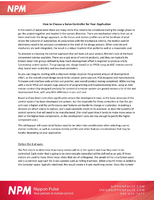New Fan Energy Index Replaces Fan Efficiency Grade
Press Release Summary:
Fan Energy Index (FEI) is the metric for efficiency provisions for commercial and industrial fans and blowers and helps system designers right-size fans. FEI will reduce wasted energy and unnecessary carbon emissions and increase fan service life. Unlike FEG, FEI considers motors and drives, not just fans, which makes FEI consistent with new efficiency metrics for pumps and air compressors.
Original Press Release:
Fan Energy Index (FEI) Coming to 2019 Edition of ASHRAE/IES 90.1
ARLINGTON HEIGHTS, Ill., August 6, 2019—When it is published later this quarter, the 2019 edition of ASHRAE/IES 90.1, Energy Standard for Buildings Except Low-Rise Residential Buildings, will be the first standard, code, or regulation to use the new fan energy index (FEI) as the metric for efficiency provisions for commercial and industrial fans and blowers, Air Movement and Control Association (AMCA) International Inc., the developer of FEI, announces.
Determined in accordance with ANSI/AMCA Standard 208-18, Calculation of the Fan Energy Index, which is available for download at no cost in AMCA’s online store at http://bit.ly/AMCA_208 throughout 2019, FEI replaces fan efficiency grade (FEG).
“This is a landmark development for AMCA, its members, and the fan industry as a whole,” Michael Ivanovich, AMCA senior director, global affairs, said. “FEI will help system designers right-size fans, and it’s easier to apply and enforce than FEG. Because fan performance is highly sensitive to operating conditions, FEI will reduce wasted energy and unnecessary carbon emissions and increase fan service life.”
Unlike FEG, FEI considers motors and drives, not just fans, which makes FEI consistent with new efficiency metrics for pumps and air compressors. FEI is the ratio of the electrical input power of a reference fan to the electrical input power of an actual fan at the same duty point (airflow, pressure, and air density). The higher the FEI rating, the more efficient a fan will be for a given duty point. This allows engineers to perform return-on-investment analyses for different fan types, sizes, and motor/drive combinations when designing systems.
“With the adoption of FEI into ASHRAE/IES 90.1, we are optimistic about proposals pending for the 2021 International Energy Conservation Code (IECC), which will have final code-action hearings in October,” Aaron Gunzner, AMCA advocacy manager, said. “AMCA will be contacting states that have codes or are considering efficiency provisions using FEG and encouraging them to replace FEG language with the ASHRAE or IECC language. This will harmonize fan-efficiency metrics nationwide and ease the application and compliance burdens posed by FEG.”
“FEI is a new metric, so the industry has a learning curve for applying it,” AMCA Principal Engineer Tim Mathson, the primary developer of FEI, said. “With this in mind, AMCA collaborated with Productive Energy Solutions to develop professional-development-hour-eligible introductory and engineering-level online courses on FEI.”
For links to the training, as well as a host of other FEI-related resources, visit AMCA’s FEI microsite at www.amca.org/fei. To view a recording of AMCA’s July 31 webinar, “Fan Energy Index (FEI)—Changing Our Industry,” visit www.amca.org/educate/#webinar.
About AMCA International
Air Movement and Control Association (AMCA) International Inc. is a not-for-profit association of manufacturers of fans, dampers, louvers, air curtains, and other air-system components for commercial HVAC, industrial-process, and power-generation applications. With programs such as certified ratings, laboratory accreditation, verification of compliance, and international standards development, the association's mission is to advance the knowledge of air systems and uphold industry integrity on behalf of AMCA members worldwide. For more information about AMCA, visit www.amca.org.
Media Contact:
Robb Clawson
Director of Education, Marketing & Communications
847-704-6325




